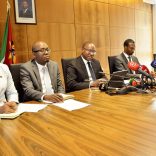Mozambique: State to sell at auction over 100 vehicles seized in criminal proceedings
Mozambique: Finance Minister justifies growth target – AIM report

Photo: TVM
Mozambique’s Minister of Economy and Finance, Adriano Maleiane, on Thursday insisted that the government’s GDP growth target of 2.1 per cent for next year is perfectly feasible.
Speaking in the Mozambican parliament, the Assembly of the Republic, on the second day of a debate on the government’s draft plan and budget for 2021, Maleiane said that in August the government had identified three possible scenarios, and it had opted for the “moderate” rather than the ”optimistic” one.
Opposition deputies had scoffed at the idea that the Mozambican economy could return to growth, despite the impact of the Covid-19 pandemic, but Maleiane said that, after a negative growth rate in the second quarter of this year, the economy had already improved in the third quarter.
“Our economy depends greatly on agriculture, which is 23 per cent of the GDP”, the Minister said, confident of significant agricultural growth in the coming year. There would be greater mechanization of agriculture, under the government’s flagship agricultural development programme, known as “Sustenta”, and the budget provided funds for deploying a further 1,000 rural extensionists. These were among the factors convincing Malaeiane that “a 2.1 per cent growth rate is realistic”.
Contributions to the debate by deputies of the main opposition party, Renamo, were unrelentingly negative, and often had little to do with the content of the plan or the budget. Thus the spokesperson for the Renamo parliamentary group, Arnaldo Chalaua, accused the ruling Frelimo Party of running a regime of corruption and nepotism, without bothering to cite any examples, while the Renamo group in the parliamentary commission on social affairs claimed that “opposition parties are prevented from exercising their political activities” and “there is day-to-day discrimination against citizens, based on their political colours”.
Frelimo deputy Aires Ali, who is a former Prime Minister, declared that the government’s plan “protects the economy and the State, and fights against unemployment. This plan supports the reform of the public administration to combat waste and inefficiency. With this plan, the government will rebuild trust in the Mozambican economy among national and international institutions”.
Anyone who wanted an agenda dedicated to development had no choice but to accept the government’s Economic and Social Plan for 2021, declared Ali.
One of the few Renamo deputies who took seriously the conflict against islamist terrorists in the northern province of Cabo Delgado was Elias Dhlakama, who is a brigadier (retired) in the Mozambican armed forces (FADM).
“We need to act to minimize the suffering of Cabo Delgado”, he declared. Inertia on the part of the Assembly “makes us complicit, and history will not forgive us”.
The defence of the nation should be in the hands of the FADM, said Dhlakama, but the FADM chief of staff, Lazaro Menete, was nowhere to be seen on the Cabo Delgado battlefront, while the man speaking on behalf of all the defence and security forces was the general commander of the police, Bernardino Rafael.
Dhlakama also complained that money earmarked for defence “is not being used to equip the FADM”.
Other Renamo deputies, such as Carlos Manuel, preferred to rehash the ancient Renamo claims that all Frelimo’s election victories have been fraudulent, resulting from “theft of votes”.
Running out of patience, Frelimo deputies reminded Renamo of its own bloodstained history as an instrument of the South African apartheid regime in the war of destabilization throughout the 1980s.
“Imagine what Mozambique would be like if Renamo had not spent all its time, ever since its creation, destroying companies and infrastructure”, said Mathias Nhongo (not to be confused with the leader of the Renamo Military Junta, Mariano Nhongo).
The most outrageous Renamo claim came from Antonio Muchanga, who alleged “in Cabo Delgado it is said that the terrorists are inside Frelimo”.
Not the slightest shred of evidence for this was offered by Muchanga, who then embarked on a personal attack against Caifadine Manasse, the spokesperson for the Frelimo Central Committee.
Manasse dismissed Muchanga as “a useless deputy, and a manipulator of public opinion, somebody who is not worth replying to”.












Leave a Reply
Be the First to Comment!
You must be logged in to post a comment.
You must be logged in to post a comment.